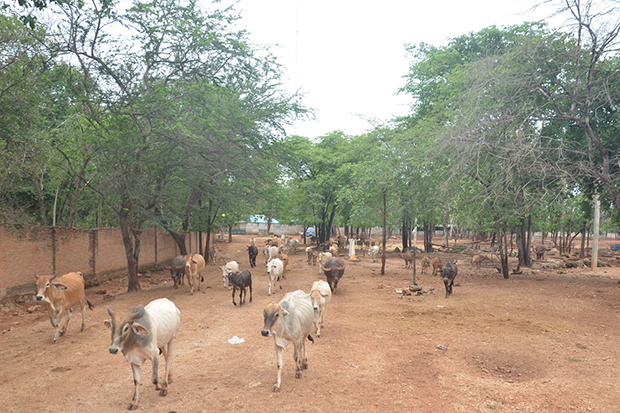
KANCHANABURI - Staff at the Tiger Temple has asked for food donations for the remaining 2,000 animals after authorities moved its tigers, leaving it with no means to raise money for their feed.
Staff at Wat Pa Luang Ta Maha Bua said there were no visitors after the Department of National Park, Wildlife and Plant Conservation (DNP), by court order, relocated 147 tigers to several breeding centres in other provinces between May 30 and June 4, according to Khaosod Online.
The temple, famous among tourists for its Bengal tigers from 2004 to last month, was accused of involvement in illegal wildlife trafficking.
Nathawut Phokaew, a temple boy (layman serving monks at a temple in exchange of shelter and food), said on Wednesday after the tigers were moved, the temple had been virtually closed.
Although the monastery no longer has tigers in its care, it has to feed about 2,000 other animals including cows, buffaloes, deer, barking deer, boars and others, he said. Many of the cattle were rescued or bought from slaughterhouses, a popular form of merit-making among Thai Buddhists.
The animals are now fed subsistence amount of feed and vegetables each day because the temple could not afford to buy more, he added.
Mr Nathawut said he and other temple staff would continue to stay out of a concern the temple would have no one to feed the animals.
"Some of them have become sick. Some are pregnant. We can't do anything but let them forage for food on temple grounds. It would be good if government officials, particularly veterinarians, could come to take a look at them from time to time.
"We would also like to call on animal lovers to donate food to the temple so we can feed them," he said.
Kasemsorn Polchai, another temple boy, said the animals were now scattering all over the vast temple land, looking for food.
"Donations for the animals are needed," he said.
In 2001, Luang Ta Chan, the abbot, took in seven wounded tigers, allegedly at the behest of villagers. Wildlife officials at the time came to take a look at them and decided the big cats needed to be impounded because they were protected animals. However, the authorities lacked the means to move or take care of them so they asked the temple to keep looking after them on their behalf.
With the rare tigers on long chains that could be petted, the monastery became popular among tourists from all over the world. Their numbers had grown to 147 at the last count in 2015. The temple reportedly relied on donations and revenue from animal shows to keep the operation.
Over the past two years, the temple was accused of involving in animal trafficking after a veterinarian who used to work for it revealed the number of the tigers was not steady.
Wildlife authorities took action in May to take away the tigers. Subsequent raids unveiled 40 bodies of tigers cubs in freezers, as well as organs and parts of adult animals. Thousands of amulets and talismans made of tiger parts were also seized.
The abbot denied any involvement, saying he had nothing to do with the operation.


